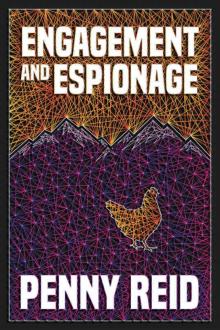- Home
- Reid, Penny
Engagement and Espionage: Solving for Pie: Cletus and Jenn Mysteries Series Book #1
Engagement and Espionage: Solving for Pie: Cletus and Jenn Mysteries Series Book #1 Read online
Engagement and Espionage
Solving for Pie: Cletus and Jenn Mysteries Series Book #1
Penny Reid
http://www.pennyreid.ninja/newsletter/
Contents
Chapter 1
Chapter 2
Chapter 3
Chapter 4
Chapter 5
Chapter 6
Chapter 7
Chapter 8
Chapter 9
Chapter 10
Chapter 11
Chapter 12
Chapter 13
Chapter 14
Chapter 15
Chapter 16
Chapter 17
Chapter 18
Chapter 19
Chapter 20
Chapter 21
Chapter 22
Chapter 23
Chapter 24
Chapter 25
About the Author
Sneak Peek: Beard With Me, Winston Brothers Book #6
Other books by Penny Reid
Copyright
This book is a work of fiction. Names, characters, places, rants, facts, contrivances, and incidents are either the product of the author’s questionable imagination or are used factitiously. Any resemblance to actual persons, living or dead or undead, events, locales is entirely coincidental if not somewhat disturbing/concerning.
Copyright © 2020 by Cipher-Naught; All rights reserved.
No part of this book may be reproduced, scanned, photographed, instagrammed, tweeted, twittered, twatted, tumbled, or distributed in any printed or electronic form without explicit written permission from the author.
Made in the United States of America
eBook Edition
ISBN: 978-1-942874-60-7
Dedication
To Amanda, thank you for the daily text messages threatening bodily harm if word counts were not reached.
And to all the Cletus and Jenn stans, this book is most definitely 100% for you.
Chapter One
“Dreams do come true, if only we wish hard enough. You can have anything in life if you will sacrifice everything else for it.”
― J.M. Barrie, Peter Pan
*Jenn*
There’s no faking quality.
A thing was either high quality or it wasn’t.
I was convinced Mr. Richard Badcock’s organic, free range eggs were the highest quality anywhere in Green Valley, East Tennessee since Nancy Danvish had retired. Perhaps the whole of Tennessee. Maybe the southeast USA. For that matter, quite possibly in the entire universe.
They were the platinum-diamond Nobel Prize of eggs. Some were narrow, some were wide; some had sage green shells, robin blue, tawny brown, or snow white; some were even speckled. But all his eggs contained firm whites and the most gorgeous orangey yolks, brighter than orange sherbet—don’t get me started on the yolks!—that I’d ever seen in all my years of baking.
I didn’t take to broadcasting this much, mostly because folks already thought I was a little off, but I didn’t think anything I made tasted as good if I didn’t use Richard’s eggs. My creations lacked a richness, a texture, one I could only achieve with Badcock eggs. And that was fact.
Which was why I was currently up to my eyeballs in despair.
“What do you mean you don’t have any eggs?” I looked behind Mr. Richard Badcock, searching his huge gated lawn and fancy henhouse in the distance.
It had white gables and eaves, a hand-welded copper gutter, and a cedar picket fence.
“Just what I said, Ms. Sylvester. I’m plum out of eggs.” His voice was firm and hard and—if I wasn’t mistaken—laced with distrust. “But if you want some fresh chicken, I know the Lee farm just butchered—”
“I can’t put a chicken thigh in a custard, Richard!” I wailed, unashamed in my anguish, my teeth chattering in the early January cold snap. “It’s not a gelatin. Fat and meat and bones won’t do me any good.”
My gaze shifted back to the man, moved over this new Mr. Badcock. I had no idea why he was behaving this way, but I couldn’t spare a thought to that. I was too much occupied by the great egg dearth of the decade.
Mr. Richard Badcock sighed, his eyebrows tenting on his forehead in an arrangement of both compassion—finally—and helplessness. “I am very sorry, Ms. Sylvester. If I had some eggs, I’d give them to you.”
“I’m sorry too, but this doesn’t make any sense. You must have a hundred chickens back there, and—”
“We have sixty-one chickens.” He sniffed, looking down his nose at me, once again hostile. “Unlike some folks, we believe our hens need space, autonomy, greens, and serenity to be good layers.”
Good Lord, now I’d offended his serene layers.
“Of course, Mr. Badcock.” I tried to make my tone conciliatory. “And I can’t tell you how much I just love—and I do mean love—those eggs. Which is why, please pardon my outburst, I am feeling a great deal of desolation at the prospect of baking without your superior product.”
His shoulders relaxed, apparently mollified, and he quit peering at me, instead sighing for maybe the tenth time since I showed up. “Ms. Sylvester, there ain’t nothing I can do. I am sorry. But we had two unexpected—and very large—orders late last night. I’m cleaned out for at least two weeks, and—”
“Two weeks?” I shrieked, completely beside myself, and clutched my chest.
He sighed again, taking off his hat and wiping his brow with the back of his flannel-covered forearm, saying nothing. His old brown eyes moved over me with a look that seemed speculative, and I got the sense he was having himself an internal debate.
Meanwhile, I was going to cry.
I could feel it. The twinge in my nose, the sting behind my eyes, the unsteadiness of my chin. Nothing seemed to be going right. Usually, I could handle a string of bad luck, but I was exhausted from pulling long hours at the bakery between Thanksgiving and New Year’s.
And I missed Cletus. Desperately. I’d barely seen or spoken to him, and we’d had zero alone time together since the end of November.
Being close to tears at present was about a lot more than the unfriendliness of the farmer in front of me, withholding the output of his serene layers. It was just the final straw.
I couldn’t go two weeks without Badcock eggs. I couldn’t. Folks would remark. They’d notice. We’d be asked if we’d changed our recipes, and not for the better. Early last month, I’d gone three days without the eggs, using instead run-of-the-mill store-bought ones, and the church choir near pitched a fit about my coconut custard pie.
“It’s fine.” Mrs. Seymour—the pastor’s wife—had said to my momma. “But what I don’t understand is, why didn’t Jenn make it? We specifically asked for Jennifer’s coconut custard pie.”
My momma had hemmed and hawed and, in the end, she’d lied. She’d told them an under-baker `made it and had eventually given it to them for free.
The thing about the church choir was, it didn’t take much to get them to sing, if you know what I mean. In fact, one might even say they were gleeful about spreading unhappy news.
Therefore, once I did have the eggs, I made coconut custard tarts with shaved coconut and dropped them off—in person—to the Saturday choir practice. All had been forgiven and the Donner Bakery’s praises were sung once more.
But . . . two weeks? With the church picnic coming up? And the first round of entries for the state fair due next week?
Lord have mercy.
I wrestled my panic and nodded for no reason, blinking away th
e irritating tears. “Well,” I croaked when I found my voice, “I guess—I guess—”
Mr. Badcock made a clicking sound with his tongue. “Fine, fine. How about this?” His reluctance was obvious. The reluctance gave my heart hope. “I have four dozen eggs up at the homestead.”
“Oh, Mr. Badcock, I would—”
“Now settle down.” He lifted his hands, even the one holding the hat. “I’ll give them to you, for double the price.”
I swallowed again because that was a tough pill. Double the price? His eggs were already ten dollars a dozen. Part of me wanted to argue. I told that part to hush. Serene eggs didn’t grow on trees.
“O—okay.” I tried to smile but couldn’t.
“And from now on,” he continued sternly, “the Donner Bakery needs to preorder their eggs three months in advance, with a—uh . . . fifty percent down payment. That’s right, fifty percent.” He nodded as though agreeing with himself.
I found myself momentarily at a loss for words, not because these were unfair terms, but because Mr. Badcock had always been opposed to preorders or prepayments prior to right this minute, said he didn’t like the paperwork.
Nevertheless, it took me less than a second to respond. “Of course. Absolutely, Mr. Badcock. In fact, I’ll be happy to place our order for the entire year right now.”
He blinked several times, visibly startled. “You would?”
“Yes. I most certainly would. I don’t want anyone’s eggs but yours.”
He blinked some more, standing straighter. “You wouldn’t?” His voice cracked like an eggshell.
“No.” On a whim, I reached forward and held his hand. He looked between my face and our joined fingers as I spoke from the heart. “Mr. Badcock, your eggs are . . . well, they’re magical. And I guess I should have told you prior to now, but all other eggs in comparison might as well be applesauce.”
Applesauce being the low-fat, vegan replacement for eggs in baking recipes. In other words, a sad and inferior imitation.
“Oh,” he breathed, blinking faster now. A bit of color touched his cheeks. “My goodness. I don’t—I mean, I don’t know what to say. This is all very unexpected.”
I released his hand, stepping away as he watched me retreat. “Just, thank you. Thank you for your eggs. Thank you for taking the time to raise those chickens right.”
“You’re welcome, Ms. Sylvester.” He sounded a bit dazed, but also proud.
As he should be. He should be proud of his serene layers.
“Anyway,” I laughed lightly. “Look at me, getting all emotional. Again, I’m sorry for my outburst. Should I send a check over? With the deposit for this year? Or how do you want to handle that?”
“Uh . . .” He glanced at the ground, looking like he was frantically trying to locate his scattered thoughts. “I guess, uh, a check is fine.”
“Glorious!” I clapped my hands together. “I’ll send my momma over on her way home from the hotel.” Hopefully, she wouldn’t mind.
Now he stiffened and his face blanched. “Your—your momma?”
“Yes.” I tried to give him a reassuring smile. It was no secret in Green Valley that my momma was as well respected as she was feared, especially with the local business owners.
“Mrs. Donner-Sylvester?” His voice cracked again, and he pulled at his open shirt collar like it was too tight.
“It’s just Ms. Donner now,” I reminded quietly. “The divorce isn’t anywhere near final yet, but she prefers it.”
“Oh, yes. That’s right.” Mr. Badcock pushed his fingers through his sweaty hair, frowning as he glanced down at his clothes. “What time would she be by?”
“About nine, I suspect. As long as that’s not too late or disagreeable to you.” Glancing at my watch, I saw it was now half past three. This egg encounter had taken much longer than I’d expected. I needed to get those four dozen eggs back to the bakery and in the fridge soon. Three new orders had come in—all for custard—and the way I made it, the mixture needed to rest overnight.
Plus, I couldn’t be late for the jam session, not again.
“Well, all right then.” Mr. Badcock, seeming both overwhelmed and resigned by the turn of events, motioned me forward. “Let’s go up to the house and get you those eggs.”
I followed dutifully, happy to have avoided a disaster.
At least, for now.
Chapter Two
“Selfish— a judgment readily passed by those who have never tested their own power of sacrifice.”
― George Eliot, Silas Marner: The Weaver of Raveloe
*Cletus*
“What’s wrong?” Drew leaned toward me as folks closest to our makeshift stage swarmed around my brother Billy, chattering good-naturedly and getting on my last nerve with their vociferous compliments.
Mind, the compliments didn’t ruffle my feathers, it was the talking and ensuing racket that had my back up. If folks could’ve communicated their praise via some other means—perhaps via a silent handshake and shared stare of admiration, or a handwritten note showcasing their superior pen(wo)manship, or a mime routine with or without the painted on face, or an interpretive dance—I wouldn’t have cared. Mylar balloons with tidy messages were an underutilized yet readily available resource, for example.
A silence ordinance, that’s what we needed. A day where folks would be forced to keep their voice boxes on the shelf or else pay a fine. I made a mental note to discuss it with the mayor, he’d always been pragmatic about new revenue streams.
“Cletus?” Drew was still looking at me, one blond eyebrow lifted higher than the other.
We’d just finished the last stanza of “Orange Blossom Special.” I surmised my friend’s unbalanced brow and question were in response to the frown affixed to my features because I should have been pleased. I was not pleased.
I’d semi-coerced my brother Billy into singing with us. A rare achievement. Billy hardly ever agreed to lend his pipes to our Friday night improvising at the Green Valley jam session. Drew was on guitar, I was on banjo, Grady was on fiddle, and with Billy on vocals we sounded like one of those real, bluegrass studio bands.
Again, I should have been pleased. And yet, I was not pleased.
Jenn was late.
Correction, she wasn’t just late, she was late as usual on a night she’d promised to be early.
“It’s time to take a break.” I didn’t look at my watch again, I’d already read it ten times. “I need to make a call.”
Drew’s stare turned probing. Abruptly, his expression cleared. He smirked a little, in that very Drew-like way of his. Which is to say, his mouth barely moved.
“Ah. I see.” Drew nodded, returning his attention to his instrument, and plucked out a C followed by a G. “Where’s Jenn, Cletus?”
A person walked between Drew and I just as the quiet words left his mouth, the man sidestepping and almost knocking my banjo with his knee in his eagerness to reach Billy. Drew lifted the neck of his guitar to keep it safe, tracking the lumbering moron with his eyes.
Usually I’d take notice, add this person to my list of affronters as One who does not respect the sanctity of the banjo. But I didn’t, because I was fixating.
Billy had finished the song with flourish, which earned a happy gasp from the audience. They’d begun their applause before the strings had ceased vibrating. Several of the spectators had even come to their feet to whoop and holler their appreciation. I wasn’t surprised. My brother had a stellar voice, I mean cosmically good.
He should’ve been a musician. Or he could’ve been one of those engineer fellas with a mohawk on the TV, telling folks how rockets work. If he hadn’t had his leg broken in high school, he also could’ve been a pro football player.
But no.
Now he was the vice president in charge of everything at Payton Mills in the middle of Appalachia. And he’s probably going to be a state senator next. And after that, a congressman.
My expression of displeasure intensified. I
was officially fixating on my misaligned hopes for my brother, determined to be irritated with his course in life since I couldn’t be content with my present circumstances.
She better not be working.
I swear, if that dragon lady mother of hers was keeping her late at the bakery yet again, I would . . .
I would . . .
I won’t do a thing.
Dammit.
I took a deep breath, scowling at the bright red theater chair in the front row. Next to it was a wooden chair that my youngest brother, Roscoe, would’ve called mid-century modern, or something hoity-toity like that.
“Where’s Jenn?” Drew repeated the question, apparently convinced the lumbering disrupter was no longer a threat to his instrument, his attention coming back to me.
“I don’t know, Drew.” I didn’t precisely snap at my friend; it was definitely more of a nip than a bite.
He ignored my hostility, strumming out a chord. “She working late again?”
“Apparently.” I said this under my breath.
It wasn’t my place to say anything to Diane Donner-Sylvester (soon-to-be just Donner) on behalf of her daughter. It was up to Jenn to stand up to her mother, set and enforce boundaries. Jenn needed to be the one to call the shots. I knew that. But I didn’t have to like it.

 Laws of Physics Book 1: MOTION
Laws of Physics Book 1: MOTION A Beardy Bonus: Winston Brother Series Book #8
A Beardy Bonus: Winston Brother Series Book #8 The Neanderthal Box Set: A Workplace Romance, 2020 Revised and Expanded Edition
The Neanderthal Box Set: A Workplace Romance, 2020 Revised and Expanded Edition Engagement and Espionage: Solving for Pie: Cletus and Jenn Mysteries Series Book #1
Engagement and Espionage: Solving for Pie: Cletus and Jenn Mysteries Series Book #1 Dr. Strange Beard: Winston Brothers #5
Dr. Strange Beard: Winston Brothers #5